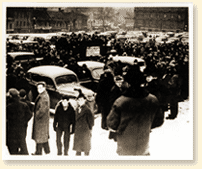

Anti-conscription rally in front of the Chateau Frontenac, Quebec City, Que. |
Politics and Government: Conscription
Conscription, or compulsory military service, divided the nation in
the Second World War and threatened the survival of political
leaders. In 1939 Prime Minister Mackenzie King, conscious of the
opposition of French-speaking Quebec to conscription in the First
World War, promised that there would be no conscription for overseas
service. By mid-1940, however, there was enormous pressure from
English Canada for total mobilization of manpower. King introduced
the National Resources Mobilization Act (NRMA), which called for a
national registration of eligible men and authorized conscription
for home defence. From April 1941 the young men called up were
required to serve for the rest of the war on home defence duties. But this was not enough for some in English-Canada, which provided
the bulk of the volunteers for the armed forces. They had an
uncomplimentary name for the NRMA conscripts, calling them "zombies"
- the living dead, only half human, who peopled horror movies.
Increasingly, there was pressure on the "zombies" to volunteer for
overseas service. With the entry of Japan into the war in December 1941 came further demands
for overseas conscription. In a plebiscite of April 1942, King asked
Canadians to release him from his 1939 promise. Overall, the "Yes"
side won, with 64%, but Quebeckers voted 73% against and many other
non-English-Canadians were also opposed. The NRMA was amended to
allow conscription for overseas service, but for now King went no
further because there were sufficient volunteers still available. Fighting in Normandy after led to high casualty rates among
the infantry. J.L. Ralston, Minister of National Defence, was
convinced that it was essential to send conscripts overseas as
reinforcements. When his Cabinet colleagues could not agree, King
forced him to resign and turned to General A.G.L. McNaughton as the
new Minister in a last-ditch effort to avoid conscription. But
McNaughton too, despite his great prestige, was unable to find
enough NRMA men willing to volunteer. On November 22, 1944, King was
forced to reverse his position and order conscripts overseas. Some 13,000 NRMA men eventually left Canada, but only 2,463 reached
units in the field before the end of the fighting. 69 died in
battle. Related Newspaper Articles
English Articles
- The Conscription Issue
The Globe and Mail, 19/09/1939
- Canada Hesitates Over Wider Draft
The New York Times, 11/01/1942
- A Plebiscite!
The Globe and Mail, 23/01/1942
- Justifies His Stand
The Hamilton Spectator, 27/01/1942
- Canada Holding War Plebiscite
The New York Times, 25/04/1942
- Canada Keeps the Faith
The Hamilton Spectator, 28/04/1942
- Girls Refuse to Work Under 'Zombie' CSM
The Globe And Mail, 22/08/1944
- The Conscription Question Must Be Settled Now
The Toronto Telegram, 02/11/1944
- Armed Violence Threat Holds Unit in Camp
The Globe And Mail, 29/11/1944
- Reveal 12,000 N.R.M.A. Troops Went Overseas
The Hamilton Spectator, 09/07/1945
French Articles
-
Le gouvernement impose le service obligatoire au pays
Le Devoir, 19/06/1940
-
La loi King votée aux Communes et au Sénat
Le Devoir, 21/06/1940
-
Les règlements du service obligatoire au Canada
Le Devoir, 28/08/1940
-
À Ottawa. Pour la conscription outre-mer?
Le Devoir, 17/03/1941
-
Politique de guerre. Mauvaise foi de nos conscriptionnistes
Le Devoir, 24/04/1941
-
À Ottawa. Ce que veulent d'abord les conscriptionnistes
Le Devoir, 08/01/1942
-
À Ottawa. Le volontariat continue de donner plus de recrues qu'il en faut
Le Devoir, 04/02/1942
-
Conversation avec le général McNaughton. A-t-on besoin de plus d'hommes outre-mer...
Le Devoir, 05/02/1942
-
M. Godbout et le plébiscite
Le Devoir, 13/02/1942
-
Le plébiscite. "La ligne pour la Défense du Canada ne combat ni M. King, ni le gouvernement, ni le parti libéral"
Le Devoir, 20/03/1942
-
Le plébiscite. Le vote des soldats en Angleterre
Le Devoir, 16/04/1942
-
Le premier devoir de loyalisme d'un Canadien... est envers le Canada
Le Devoir, 20/04/1942
-
"Le Québec refuse, à une foirte majorité, de dégager M. King. Dans le reste du Canada, les conscriptionnistes l'emportent"
Le Devoir, 28/04/1942
-
"Environ 560,000 votes négatifs, hors du Québec"
Le Devoir, 29/04/1942
-
Le plébiscite. Déclaration de la ligue pour la Défense du Canada
Le Devoir, 29/04/1942
-
"À Ottawa. Outre-mer, nos soldats ont donné 72% de voix affirmatives, au plébiscite "
Le Devoir, 06/05/1942
-
"Ce sera la conscription dès qu'elle sera "nécessaire". M. King déclare que si elle ne l'est pas, il n'y en aura pas"
Le Devoir, 08/07/1942
-
Le premier départ des conscrits se fera en décembre
Le Devoir, 25/11/1944
-
"Lettre d'Ottawa. 11,836 conscrit servent outre-mer"
Le Devoir, 06/04/1945
-
Appels suspendus pour le service militaire
Le Devoir, 08/05/1945
|